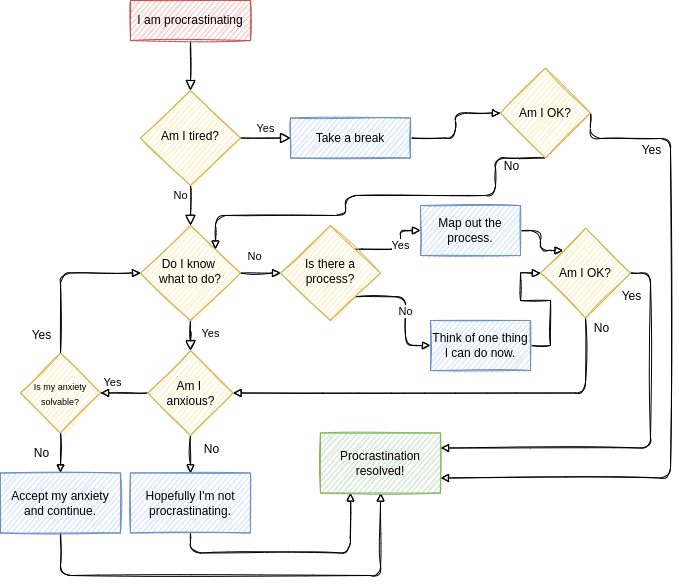Laziness Does Not Exist: 3 Questions to be More Productive
Posted on Sun 13 March 2022 in general

This is part of a series of short articles on rational tools to help you be more productive while still practicing self-care. To jump to the summary, click here.
Do you procrastinate? How much? Do you feel like you could achieve more if you procrastinated less? Wouldn’t it be great to have more motivation?
This is how the pitches for a lot of self-help books read. If you follow a guru’s chosen methods, you’ll never procrastinate again, and if you do, it’s your fault for not following the methods correctly.
However, according to Dr Devon Price in Laziness Does Not Exist, there are only two main causes of procrastination on a given activity.
- Not knowing what to do.
- Anxiety (or other negative feelings) about the activity.
To these two I’d also add being physically exhausted. However, if you find yourself falling asleep when you need to work, broader lifestyle issues might be at play — those are beyond the scope of this article.
“Being lazy” is not on this list. Negative self-talk around productivity is not helpful for actually completing anything, and may contribute to anxiety, which is likely to make procrastination worse. The method in this article has helped me deal with my own tendencies to procrastinate, which I suffered with through high school and college, and it doesn’t involve blaming yourself or trying to work harder.
The first thing you need to do is figure out which causes of procrastination are relevant to you.
This is fairly easy to do: just ask yourself a series of questions, in the following order:
Am I physically unable to complete the task?

Photo by Karolina Grabowska from Pexels
This comes first because it’s normally easy to figure out when you’re tired, hungry or in pain. If none of these apply, you also know that your problem can be solved relatively quickly. If they do apply then you should try to solve your physical problem before forcing yourself to continue working. This probably means taking a nap, resting or eating something.
A quick note on tiredness. If you feel tired, ask yourself what you’d rather be doing. If the answer is “sleeping” or “resting”, you should take a break. If the answer is something more active like “playing video games” then you’re not physically tired and this is likely a response to one of the other causes of procrastination. If you find that you always get ‘tired’ when you need to work, consider moving this question from first to third.
Do I know what I need to do?

Photo by Andrea Piacquadio from Pexels
If you don’t know what to do, how can you do it?
To be clear, I don’t mean “knowing what to do” in the abstract sense but in the sense of concrete actions you can take now. For example, you might know that you need to write a dissertation for your BA, but do you know what you need to do now? You might want to start a business selling scented linen, but where to start?
There are two approaches we can take to this problem. If the process is knowable, we can write it out and complete it step by step. In the dissertation example, there is a clear set of steps: we begin with a literature review, formulate a research question, conduct research, write up our results, and edit. As an undergraduate, I didn’t understand the full research process and learned it the hard way, but I could have asked my professors or read a book about it and mapped out the process.
In the example of starting a business, the process is unknowable. There are so many complexities and particularities to making a business profitable that there is no single process that can guarantee you profits. Instead you need to start from the basics. This means brainstorming a set of actions you can take that will bring you closer to what you want to achieve, and just doing them. For example:
- I can ask on social media to find out what types of people buy scented linen.
- I can conduct a survey with the types of people who buy scented linen to see how much they’re willing to pay, what’s good quality for them and what scents they like.
- I can find out ways to get scented linen and see which works with my customers’ preferences and the price they’re willing to pay.
- I can research online platforms which allow me to list and sell my linen at a reasonable price.
If the process of figuring out what to do feels a little overwhelming at first, don’t worry! The entire field of strategy is based on figuring out what to do in complicated situations, and it gets easier with practice.
Am I anxious about the task?

Photo by Andrea Piacquadio from Pexels
This comes last because navigating anxiety can be complicated, and there’s a whole approach to therapy (cognitive behavioural therapy) which is based on unpacking how our negative thoughts can cause distress.
These approaches to handling work anxiety come from my own experience with anxiety and some tools I’ve picked up from therapy, but I’m not a therapist. If anxiety is a frequent and serious issue for you, please consider attending therapy to figure out the best course of action for you.
If your anxiety is related to a specific outcome, then it might be worth thinking through that outcome. For example, I am often anxious when writing articles because I’m worried about the response I will get. I worry that I’ll either get a massive negative response to my writing, or that nobody will care what I write. Realistically, the response I get to any given article will likely be somewhere in the middle of those two extremes. But ultimately, whether I get a large negative response or no response at all, I can manage both of those outcomes.
If your anxiety is not related to a specific outcome but is more existential, then it might be worth unpacking those feelings too. For example, I sometimes worry that time I spend writing articles is a waste of my time because I can’t control other people’s reactions to my work. By recognizing that I don’t have control over what others think of my work, I no longer need to worry about it. The anxiety has no specific cause or solution, so it’s not worth worrying about.
For me, I find that the most likely cause of procrastination is anxiety, followed by not knowing what to do, followed by physical exhaustion. However, I have the privilege of working a regular schedule and not having extensive commitments outside of work. If you regularly work 60+ hour weeks and make the compromises on diet and sleep needed to do so, as I’ve done at certain times of my life, you might find that your “procrastination” is really your body telling you to slow down. In which case, listen to your body. Burning yourself out is not going to help you achieve your goals, regardless of how frustrated you might be.
Summary
There are 3 causes of procrastination on activities:
- Not knowing what to do.
- Anxiety about the activity.
- Physical exhaustion and other distractions.
Process to resolve procrastination:
- Don’t panic! Avoid thoughts like “I’m lazy.” or “I always do this.”
- Determine which of the 3 causes is relevant to your situation. Ask yourself:
- Am I exhausted and require food, drink, or sleep? If not...
- What is the first thing I need to do?
- How do I feel about doing it?
- Figure out a plan to resolve the problem based on which causes apply to you.

If you don’t know what to do, you can:
- Break your problem down into smaller tasks and figure out a process.
- Figure out a small task that gets you started in the right direction.
- Reach out to others for advice or guidance on the process, or look for information about the problem you’re trying to solve.
If you feel anxious about the task, you can:
- Examine the causes of your anxiety. Are they rational? Do they bear on the problem at hand? Can you resolve your anxieties about the task? (Cognitive therapies like CBT specialise in this process.)
- If you can’t resolve your anxieties, can you accept them and continue?
- Talk to people with experience with the task. How did they overcome their anxieties? What was their process?
If you are exhausted, you can:
- Take a break from the work. If you are on a deadline you may need to timebox your breaks.
- Take a power nap or eat a snack.
- Consider physical causes: your sleep cycle, diet, and level of physical exertion are the most likely.
- If relevant and possible, ask for an extension on the activity to avoid burnout.